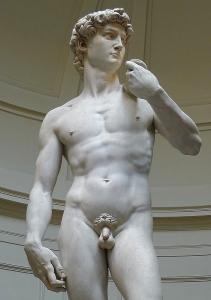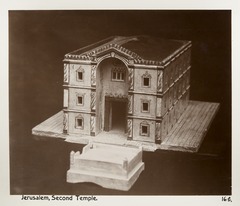 2 Samuel 7 has long been seen by scholars as an interlude between the creation of the capitol city of Jerusalem, the setting of the Ark in the city, and the continuing strife that ensued between Israel and various enemies, leading up to the watershed events surrounding David’s adultery with Bathsheba and the arranged murder of her husband, Uriah. In this chapter we find language strikingly dissimilar from that of the narratives that precede and follow; it is preachy language, quite formulaic, reminiscent of the style of Deuteronomy that some four centuries after David’s reign would dominate the literature of Israel. It may well be that the chapter has been added later than the larger narrative corpus that surrounds it. Nevertheless, 2 Sam.7 plays a significant role in that narrative, and though it does offer decided differences in tone and emphasis, many of the familiar themes of the larger story still persist.
2 Samuel 7 has long been seen by scholars as an interlude between the creation of the capitol city of Jerusalem, the setting of the Ark in the city, and the continuing strife that ensued between Israel and various enemies, leading up to the watershed events surrounding David’s adultery with Bathsheba and the arranged murder of her husband, Uriah. In this chapter we find language strikingly dissimilar from that of the narratives that precede and follow; it is preachy language, quite formulaic, reminiscent of the style of Deuteronomy that some four centuries after David’s reign would dominate the literature of Israel. It may well be that the chapter has been added later than the larger narrative corpus that surrounds it. Nevertheless, 2 Sam.7 plays a significant role in that narrative, and though it does offer decided differences in tone and emphasis, many of the familiar themes of the larger story still persist.
The issue that the chapter addresses is the reality that David did not in fact build the temple for YHWH, but that his son and heir Solomon was the one who performed that task. The tale attempts to answer the question of why that was the case. The story avers that David had every intention of doing just that. He spoke to Nathan, his court prophet, (this is the first mention of this important figure): “Look! I am living in a cedar wood house (cedar being a luxury item, imported from the forests of Lebanon), while the Ark of God is living among curtains” (2 Sam.7:2. “curtains” is literally what the Hebrew says, but clearly the author has in mind the larger edifice, the sacred tent). Nathan responds to the king, “Whatever is in your heart, go, and do, for YHWH is with you” (2 Sam.7:3). This reply carries a fateful echo of the comment of an earlier prophet, Samuel, who suggested the same kind of free and divinely supported action when first he crowned Saul king (1 Sam. 10:7). Later, we will remember, the supposed freedom of action that Samuel promised to Saul turned out to be no true freedom at all, when the prophet hedged Saul’s actions in at nearly every turn, and when the first king of the land attempted to exercise that freedom, he was rebuked and rejected by that same prophet (1 Sam. 10:8-9, 13:8ff). To the contrary, here Nathan appears to believe that David has the freedom to do just as he pleases, precisely because he is YHWH’s chosen one.
But in a night dream, YHWH reveals to Nathan that God has other plans for David. In fact, YHWH seems to be somewhat miffed that any mortal, let alone YHWH’s appointed king, should take it upon themselves to build any kind of house for God. “Is it you who would build me a house for me to live in? I have lived in no house from the day I brought Israel up out of Egypt until this day; I have moved about in tent and tabernacle. Wherever I went among the Israelites, did I speak a word among any of the tribal chiefs of Israel whom I appointed to shepherd my people Israel, saying, ‘Why did you not build me a cedar wood house” (2 Sam.7:5-7)? This talk of a permanent dwelling for YHWH appears to be cheeky in the eyes of that God, and smacks of human arrogance rather than pious desire. Plainly, YHWH has no interest in David building any sort of dwelling for God. 
In a later retelling of this long story by the Chronicler of the 5th-4th century BCE, it will give a very different reason for the denial of David’s building plans. At 1 Chronicles 22:8, it is said that David hears directly from YHWH concerning his building plans: “You have shed much blood and have waged great wars; you shall not build a house to my name, because you have shed so much blood in my sight on earth.” This is one of the very few places in the Chronicler’s account of the story of David that recounts a divine rebuke for the near saintly king, who according to the Chronicler spends the bulk of his time writing songs and directing holy choirs. In the Chronicler, we hear absolutely nothing of Bathsheba, Uriah, or any kind of evil doings on the part of David. But here David’s bloody deeds prevent him from temple building. Though the author of the Samuel narrative has nothing direct to say concerning the reason for YHWH’s rebuke of David, in the course of the long narrative it appears that David is far too busy with court intrigue and family matters to allow time for temple building. The implication in 2 Sam.7 is that it a clear act of haughty presumption for any mortal to dare plan a temple to house the movable God of Israelite history.
Whatever the actual rationale against David’s building plan, the fact is that the temple is a crucial edifice in the subsequent 350 year history of Jerusalem and Israel. And it is not for any human being on his own to build, but it will be a house conceived and finally constructed by YHWH, and will only be built when YHWH is ready for it to be constructed. The temple of Jerusalem will ultimately be a sign of God’s presence with them and at the same time a divine seal of approval for the ongoing dynasty of David. Thus, perhaps even more important than the building itself is what YHWH proposes to offer to David, namely the creation of his “house,” that is to say his dynasty. Indeed, the dynasty of David is to last for perpetuity; as long as there is a king on the throne of Israel, directly descended from David, says YHWH, the God will be with them. And that claim persists for the succeeding centuries, finally bleeding over into the Christian world as Jesus is claimed to be the heir of David, the final successor prophesied and promised by God: “of his kingdom there will be no end,” a “kingdom of endless peace for the throne of David” (Is.9:7), lines taken up by the early Christians as predictive of the coming of Jesus Messiah.
Despite these enormous promises from YHWH, nevertheless, the king is warned that he will still fall short of YHWH’s hopes for him, and as a result he will suffer punishment for his wrongdoings. “I will be a father to him, and he shall be a son to me. When he commits iniquity (the clear implication is that he will commit iniquity), I will punish him with a rod as mortals use, with afflictions by human beings” (2 Sam. 7:14). No supernatural heavenly bolts will serve as punishment, but all punishments will be all too human. As we will see, that sort of punishment is precisely what David will undergo as the tale unwinds.
2 Sam.7 may be overtly concerned with the house of the temple of Jerusalem, but its more important concern is with the “house” of David, that dynasty that will live throughout the history of Jerusalem and Judah, and will become the undergirding of the Christian hope in God’s continual presence with them in the person of Jesus, heir of David. Ironically, it is the dastardly David, the abuser, adulterer, and murderer, who serves the traditions of the Bible as harbinger of the hope of God for all people, whose house will be an eternal one, taken up and nurtured by Jesus of Nazareth, whose house, it will be said, “is laid up in heaven, not built by human hands.”
(images from Wikimedia Commons)











